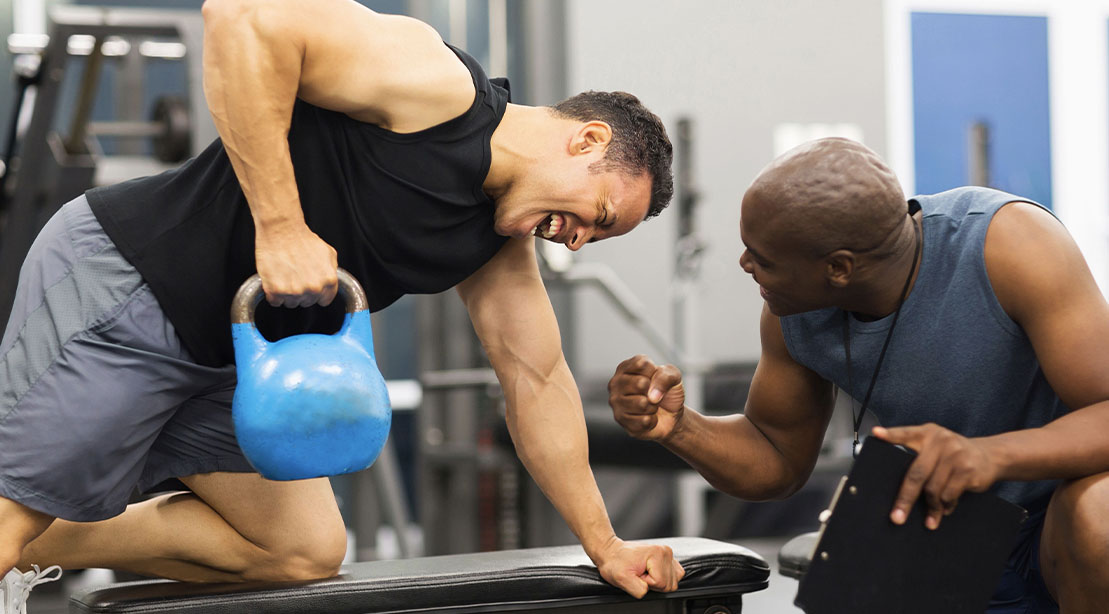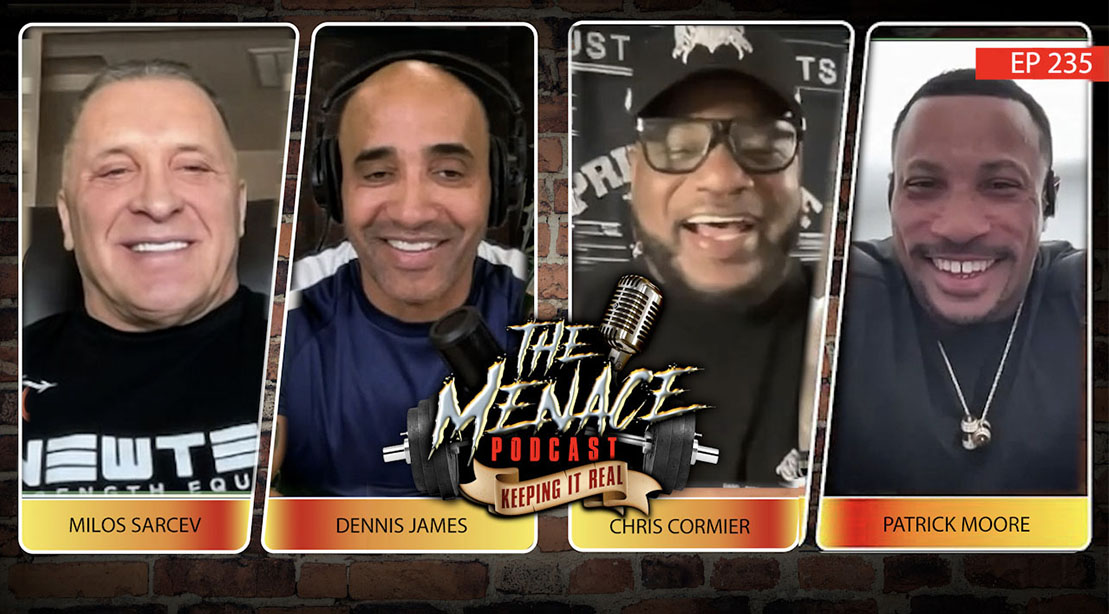
The semantics of this so-called “evolution” I’m about to recount are a bit dodgy when it comes to the title of a trainer, a coach, or a guru. What exactly each one does fits nicely on a Venn diagram, with the bodybuilder in the center. But in today’s reality, are they really necessary, and in what capacity? Attention is being drawn to this subject lately because it seems like there are some coaches out there making an awful lot of hay off their clients’ victories.
Note: I’m using “Olympia” as almost a metaphor for any Olympia-level pro show, male or female, of any division — not just the Mr. Olympia, although much attention will be devoted to the guys who compete in the Mr. O, the Arnold Classic, and the various Olympia qualifiers.
Back in the Arnold/Franco era, there were no “coaches” or “gurus” or “trainers.” There were training partners, but there were no trainers. Sometime during the ’90s the “coach” became an integral part of the champion’s victory. And the coaches were starting to make a name for themselves.
Today, there are well-known coaches who actually claim the champ’s victory as a win for themselves and tout such victories in their advertising for whatever they’re selling. It’s a dichotomy that strains logic. Why in the world does a seasoned IFBB pro need a guru, trainer, coach, whatever? Why don’t they know how to do bodybuilding by themselves? The fact that they can’t means that the athletes have either grown incredibly lazy, or bodybuilding (pick up heavy stuff and put it back down, repeat) has gotten just too complicated — or both. Either way, I think “coaching” has surpassed the nuts and bolts of competition and turned into hand-holding.
Sometime during the early ’80s, I was talking to Ken Waller in his gym in the basement of some hotel in Playa del Rey. Dressed in his trademark sweatpants and a leather jacket, we were talking about a new giant franchise gym that opened up in Santa Monica — the first of its kind — called Sports Connection. It had racquetball courts, jacuzzis, saunas, some really good first-gen Nautilus equipment, and the usual loose stuff. That’s where group fitness and the aerobic classes gained popularity. And with that came the inevitable aerobics bunny and a level of drama unthinkable even at the height of the women’s movements of the ’60s… But that’s a whole other story…
The point is, available in this two-story cavernous expanse of high-end retail office space in Santa Monica, was a new breed of human we know today as the “personal trainer.” And while in theory a good thing, particularly for the novice — this was 1983 — there were no certifications, schooling, nada… nobody knew anything. A couple of bodybuilders filled the “trainer” position for a while. Apparently they taught other trainers… I don’t know nor remember that part of it. For this discussion it’s irrelevant. The point is, now there was such a thing as personal trainers. And to the hardcore bodybuilders a few blocks away in Venice, the idea was ludicrous, as evinced by the comment Ken Waller made that day when I saw him at the gym with the vitamin pack guy. “What the f*** is a personal trainer?” Waller belted out. “Someone who counts to 10 for you?”
And, honestly, back then, Waller was pretty much right. Oh, and you want to talk aerobics bunny-level drama? Yeah, the personal trainer space was ripe for that. Especially when they started showing up at Gold’s. It was a warm, fertile breeding ground for extramarital affairs. Naturally, the blowouts were epic… Personal belongings in a pile on the lawn and hanging from the trees below the bedroom balcony-level blowouts. But, again, that’s a whole other story…

So, back to the personal trainer… superfluous to the bodybuilders at the beach, but they were nevertheless here to stay. Proof, I reckon, is the fact that we still have them today — hopefully better educated. But that, of course, is open for debate. What’s relevant at this point is the genesis of the personal trainer. And this was not confined to Southern California.
It may have grown teeth in SoCal, where I watched it happen, but the phenomenon was spreading all over the world and everyone wanted a piece of it.
Now, whether it was a natural progression or a means to draw attention to yourself and establish a point of difference, the concept of nutrition crept into the equation. So, now you had non-certified personal trainers who were also dispensing nutritional advice (without an education or a license), including nutritional supplements and, in some cases, drugs that ranged from appetite suppressants and stimulants to full-blown steroid and androgen cycles.
Ultimately, the specialists cleaved themselves off. Trainers who were sick of their clients lying about cheating on their diets just quit doing diets and referred them to someone who did. Eventually, others followed suit until we ended up with a split between personal trainers — who just trained people — and coaches — who did the rest of it. Eventually, coaching grew a very specialized arm that became the bodybuilding guru. This is a guy who specializes in taking athletes with potential and squeezing every last drop out of them with whatever methods and means available, regardless of the legality or the cost… all kinds of costs.
Somehow, in the machination of all of this, the modern-day bodybuilder became gradually more and more exempt from knowing anything about their diet, the drugs they’re taking, or how to prep and dial in for a show. I have referenced many times a top IFBB pro I interviewed — a top 10 Olympian — who would wake up every morning, shoot three or four selfies and text them to his coach and literally sit there and wait for him to respond with what would be the layout of his first three meals. I’m sorry, but that’s just a bit too hands-on for me. And, so far, he hasn’t won the Olympia. So…
Over the years I’ve been involved in this industry — almost four decades, in fact — I have watched bodybuilders become so reliant on their coach that they have completely lost touch with how their own body actually works, to the shameful degree that today we have coaches who, while hawking their proprietary nutritional products, tout the fact they have X number of Olympia wins to their credit — THEIR credit. Because they did for someone who should have been able to do it for themselves. In fact, it should be required. It should be part of the game.
This begs the question: If gurus/coaches had never entered the realm, would the same guys have won?

I say — for the most part — yes. And I’ll tell you why… imagine if there were no such thing as coaches. What if you had to learn about nutrition and how your body works, how it responds to macros, supplements, drugs, your workouts, how it recovers… imagine if you had to do your own experimentation with all the elements that would amount to having left no stone unturned come contest day. You had to do it yourself because it was part of the deal.
What would you do? Would you hang up your posing trunks and quit because it was too hard? Or would you figure it out like bodybuilders used to? I dare say you would figure it out and, for the most part, the same guys would have won. Sure, in some cases, they may have looked a little off, maybe a place or two might have changed, but Coleman was still winning eight — with or without help.
If anything at all, a bodybuilding coach should be a second set of eyes, someone who can offer a blunt and honest assessment of what you look like, off of whom you can bounce ideas and who can help cheer you on or tell you that you’d better step it up. But that’s it. Like a golfer’s caddy, not the guy swinging the club. In my opinion, no coach in this biz should be able to claim a contest victory. None. All that does is create an irrational dependency on the coach and diminish the athlete. Worse, it makes the athlete either give up on, or not enrich, his knowledge of himself. Just hand it off to someone else and trade in his self-reliance so he can become someone else’s science project.
In what other realm does that make sense? None. Nor should it.
And don’t give me the “but the athletes look better today” crap. They don’t. Not a single show put on today can match a mid-’90s lineup. Not one. And almost none of those “’90s guys” used a coach, let alone a coach who would ultimately take credit for their win.
Rich Gaspari brought striated glutes to the stage for the first time in the history of the sport in 1987 and set a new standard in conditioning with no coach (no diuretics either). How come he could do that while a modern contemporary is sitting by his phone waiting to find out what he’s going to eat next? Our first nine Mr. Olympias, and the guys who finished under them, for the most part, didn’t have a coach. Today the reliance is so deep that the coach can actually claim a win and no one flinches. Think the guy who taught driver’s ed to a Formula One champion can claim the win? It’s the same thing.
This is an odd evolution to be sure, but I don’t know if I’d necessarily call it progress. Are coaches useful? Absolutely! I know a lot of good ones, not to mention that I’ve been one for decades to numerous athletes, from many different disciplines, to accomplish gaining a degree of performance enhancement or win a competition. I had those who wanted my help to exact maximum performance while not breaking the rules, to those who wanted to cheat and not get caught (if you think the split was 50/50, or anywhere near it, I have a bridge I can sell you).
Indeed, my particular niche is highly specialized, yet I’ve never promoted the fact that none of my charges ever failed a drug test. Word gets around, my friends. Remember, it’s the quiet ones you have to worry about. I chose to serve a very specific clientele, all of whom found their way to me of their own volition. All of whom walked away very, very happy.
Notice I said “walked away.” Meaning, your job as a coach is to teach and inspire and empower, not create a dependency. It warms my heart when I see former charges of mine posting about the success they have with their own clients. The vids they post all show the stuff I taught them. That kind of smile is hard to pry off my face. But that’s the whole point — teach, inspire, walk away.
To the novice, a good trainer, or a good coach, or both, is indispensable. Beginners need them — if for nothing else but preventing injuries, let alone workout routines, constructing a workout, timing, training splits, recovery, etc. But only up to a point. Being a successful bodybuilder, or any athlete for that matter, requires diligence, discipline, and knowledge. If you’re an IFBB pro, competing for hundreds of thousands of dollars and a slew of lucrative endorsements, then you should have to compete on your own and keep your victories all to yourself.
Remember, I’m not anti-coach. I’m anti-dependency. We have a very rich history, with almost half of our Olympia winners doing contest prep largely on their own. Where and why did that tradition get canceled? It takes, what, six guys to win an Olympia now?
Kevin Levrone told me he ate fish and broccoli for 12 weeks before the Olympia. I don’t know about you, but I could tolerate that for a day, maybe two — but geez… 12 weeks? That’s insane discipline. Why did he do that, from where did he get that idea? He figured it out. “That just works the best for me.”
If you need a coach to help you figure that out, okay, fair enough. But, after a couple of rounds, you should be able to bro hug and move on — not move in together.

